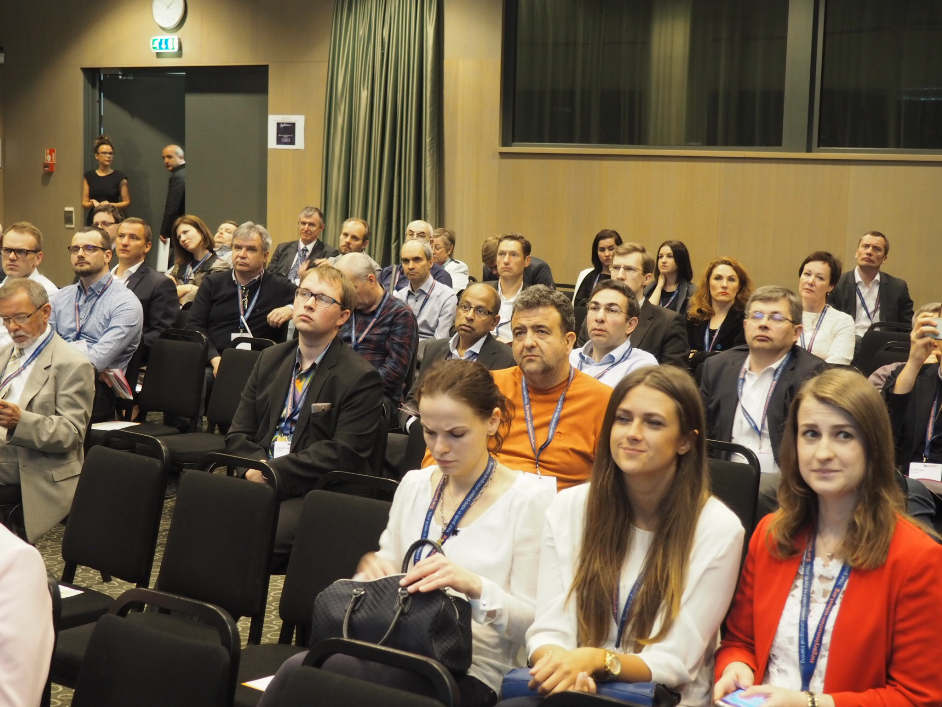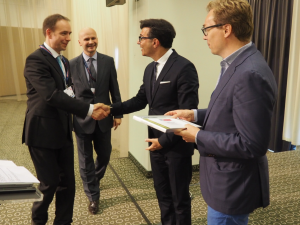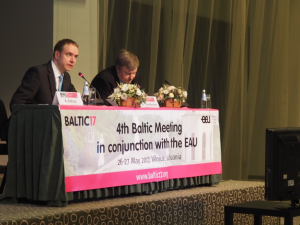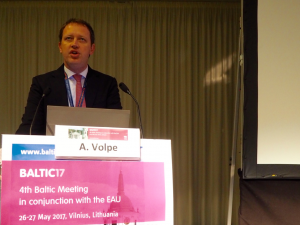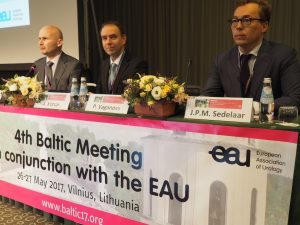Fresh perspectives and a different take on various urological conditions were presented during the highly-anticipated Young Urologists Competition session of the 4th Baltic Meeting in conjunction with the EAU (BALTIC17) which opened today in Vilnius, Lithuania.
Chaired by Professors Bob Djavan (AT) and Michel Sedelaar (NL) the competition aimed to test the mettle and insights of young promising urologists from four participating countries namely, host country Lithuania and its neighbors Latvia, Estonia and Belarus.
“The jury will not only decide on the actual content but also on the presentations and how the contestants will defend their views before the jury. A persuasive, elegant presentation is among the qualities that we are looking for,” said Sedelaar during the start of the contest.
From Vilnius, Dr. A. Patasius examined the modern approach to managing hereditary prostate cancer, while his opponent from Riga, Dr. Arvis Freimanis looked into the characteristics and outcomes of patients with urosepsis in an intensive care unit.
Meanwhile, contestants Rauno Okas from Talinn, Estonia, presented his views on managing urethral trauma, while Leonid Suslov from Minsk, Belarus, discussed the importance and limits of warm ischemia during partial nephrectomy.
Patasius discussed BRCA testing for all prostate cancer patients and posed the query whether it should be made part of standard care practices. He, however, noted that this possibility is not viable due to the multigenic nature of BRCA, its long list of suspected alleles and polygenic combination, among other factors.
“Genetic counselling is indicated for young patients (less than 55 years) with diagnosed prostate cancer,” he said in his concluding remarks adding that SNP’s included in genetic risk scores could reduce the number of unnecessary biopsies. His statement prompted a flurry of comments and questions from both the audience and the jury members.
Freimanis, on the other hand, built up his presentation by looking into the background and incidence of urosepsis and described the study design of his group. “Urosepsis is a serious and threatening situation with a higher mortality risk in elderly, and in patients with severe concomitant disease and with more severe clinical state at presentation,” he observed.
He also said that empirical antibacterial therapy should be “in accordance with the local and regional resistance patterns and most common pathogens.”
“Microbiological cultures are of the highest importance in effective management of septic patients and antibacterial therapy should be individually adjusted as soon as possible,” he added in his concluding remarks.
Okas provided a compact overview of urethral trauma management, discussing incidence, morbidity, anatomy, diagnosis, classification, treatment and evidence. In his take-home messages, he highlighted the role of early endoscopic realignment and noted that about 50% of the cases do not need any further treatment, around a third of cases can be managed endoscopically and a fifth would need urethroplasty..
Suslov took the tail-end of the presentations with his discussion of the limits of warm ischemia. “Warm ischemia affect early and late postoperative renal function,” he said and added that animal experiments may not correlate well with human response to ischemia. He also noted that in studies, only a solitary kidney is the ideal model for research and that among the problems are the absence of randomised trials, the lack of patients and data of renal volume.
The winner of the cash award will be announced tomorrow, Saturday, on the second and last day of the annual event.

